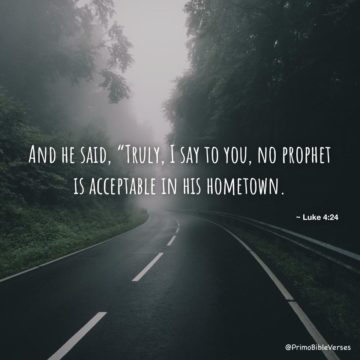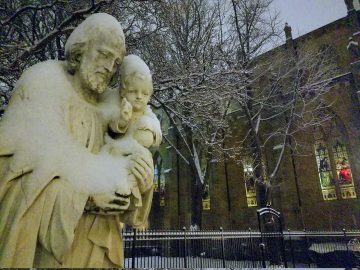For the Fourth Sunday of Ordinary Time Franciscan Friar Fr. Paul Gallagher offers us these Gospel Reflections. The content is edited by Franciscan Sister of Christian Charity Sister Anne Marie Lom and Joe Thiel. The excerpts from the Sunday readings are prepared by Joe Thiel. To read or download the complete pdf with excerpts for your prayer, please click here: Franciscan Gospel Reflection January 30 2022. Excerpts are from the Lectionary for Mass for Use in the Dioceses of the United States of America, second typical edition © 2001, 1998, 1997, 1986, 1970 Confraternity of Christian Doctrine, Inc., Washington, DC. Used with permission. All rights reserved. No portion of this text may be reproduced by any means without permission in writing from the copyright owner
Luke 4:21-30
 Jesus continued speaking in the synagogue, saying, “Today this scripture passage is fulfilled in your hearing.” And all spoke highly of him and were amazed at the gracious words that came from his mouth.
Jesus continued speaking in the synagogue, saying, “Today this scripture passage is fulfilled in your hearing.” And all spoke highly of him and were amazed at the gracious words that came from his mouth.
They also asked, “Isn’t this the son of Joseph?” He said to them, “Surely you will quote me this proverb, ‘Physician, cure yourself,’ and say, ‘Do here in your native place the things that we heard were done in Capernaum.'” And he said, “Amen, I say to you, no prophet is accepted in his own native place. Indeed, I tell you, there were many widows in Israel in the days of Elijah when the sky was closed for three and a half years and a severe famine spread over the entire land. It was to none of these that Elijah was sent, but only to a widow in Zarephath in the land of Sidon. Again, there were many lepers in Israel during the time of Elisha the prophet; yet not one of them was cleansed, but only Naaman the Syrian.” When the people in the synagogue heard this, they were all filled with fury. They rose up, drove him out of the town, and led him to the brow of the hill on which their town had been built, to hurl him down headlong. 30 But he passed through the midst of them and went away.
Background:
The first line of this gospel was the last line of last week’s gospel. Repeating that single line makes for a smooth transition and helps us remember the context of the previous gospel. The shift in the mode of the gospel is dramatic. It also moves from an emphasis on the teaching of Jesus to the reactions of Jesus’ extended family and the other people of Nazareth. In the beginning, Luke reports that the people “spoke highly of him and were amazed at the gracious words” with which he spoke (Luke 4:22). But in the next verses, those same people “drove him out of town” and intended to throw him over the edge of the hill on which the town was built (Luke 4:29).
The text provides a window into how social expectations affected people in the society in which Jesus lived. By not continuing the profession of his father, Jesus had broken with what was expected and considered honorable. The expectation was that the first-born son took the name of his grandfather and the profession of his father. He was responsible for continuing the family line, not only in having children, but also in his profession. Small hamlets needed people with a variety of trades and skills for survival, unlike many places in the contemporary society that has been shaped by the industrial era. Those skills were passed down within one’s family. Luke lets his audience know that Jesus’ hometown community found what he said impressive, but they were at the least puzzled that he was not taking up the trade of his father, Joseph.
The second breach of social norms was with their understanding that the man took care of his family and relatives first. Most of the people of Nazareth would have been related to Jesus in a variety of ways. The text suggests that Jesus had not performed his healing ministry for those of his own town and extended family. This would have been looked upon as an insult, and a denial of one of his primary responsibilities. When he was questioned about this, he made no apology or attempt to restore the breach in his relationship. Instead, he pointed to two examples in their tradition when prophets acted as agents of blessings on Gentiles. Elijah visited a widow in Sidon. She and her son were about to starve to death. Elijah prayed, and the son was restored to health, and their small supply of flour and oil lasted throughout the famine of the land (1 Kings 17:1-24). In the second example, Naaman, a great army commander for King Aram, had a form of leprosy. When the Arameans captured the land of Israel and were told of the prophet Elisha in Samaria, Naaman went to him and was cured of the leprosy (2 Kings 5:1-14). In citing these examples of prophets to explain his actions, Jesus was again casting his role among them in the light of being a prophet, and shunning their expectation for him to be a craftsman like his father.
Jesus reminding the people of Nazareth of these two incidents suggests that Jesus understands the word of the prophet Isaiah that Luke reports him reading in last week’s gospel. “The Spirit of the Lord is upon me, because he has anointed me to bring glad tidings to the poor. He has sent me to proclaim liberty to captives and recovery of sight to the blind, to let the oppressed go free, and to proclaim a year acceptable to the Lord (Luke 4:18). Isaiah looked to a time of divine fulfillment that would be extended beyond the Jewish community to the Gentiles. To Jesus’ audience in today’s Gospel, this was blasphemy, and it produced a violent response within them. They tried to kill him by throwing him over the side of the cliff on which the town was built.
Reflection Questions:
- Where have you observed the power of social expectations in the culture in which you live?
- Are you aware of times when social expectations have helped you make a decision or carry on a certain pattern of life for which you are not grateful or proud?
- Are you also aware of times when social expectations have influenced your decision or encouraged a certain pattern of life for which you are not disappointed?
- Have you ever been cast in certain light (either for the good or bad) because of your family? What was that experience like? What effects did it have?
- The people of Nazareth were said to be amazed by what Jesus said. Given the events described in this gospel, what do you think Luke meant by the term “amazed?”
- Place yourself among Jesus’s neighbors in this gospel passage. What is going though you as you hear their comments as they turn negative?
- As you hear Jesus’ response to their comments, reminding them how God chose to act on behalf of the widow in Zarephath and Naaman the Syrian, what are you feeling?
- Can you take some time to talk with God honestly and frankly about your thoughts and feelings about how people are responding to Jesus, and Jesus’ response to their concerns, or perhaps how people have responded to you?


